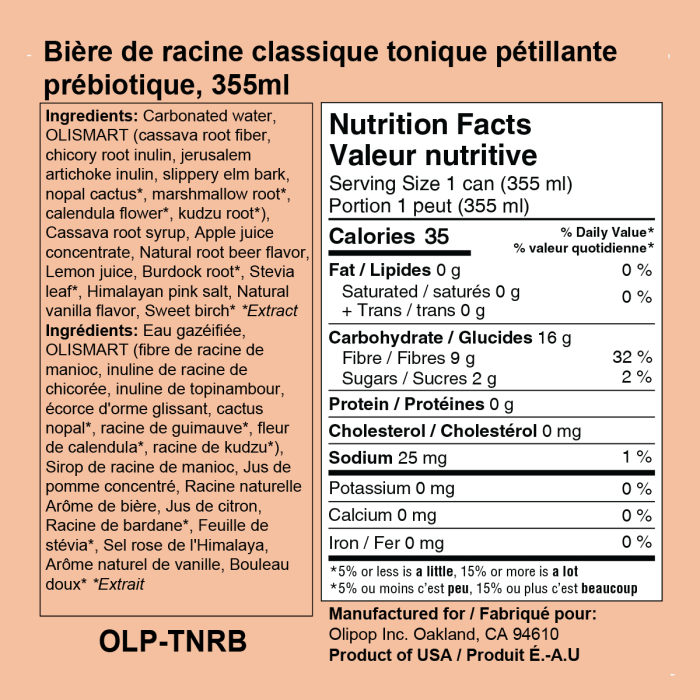Olipop Root Beer

Olipop root beer nutrition facts – Olipop Root Beer isn’t your average soda. It’s a thoughtfully crafted beverage designed to deliver a delicious root beer experience while also supporting gut health. This detailed look into its ingredients will reveal the science behind the satisfying sip.
Olipop Root Beer Ingredient Breakdown
Understanding the ingredients in Olipop Root Beer is key to appreciating its unique profile. The following table provides a comprehensive list, detailing the quantity per serving and the role each component plays. Note that specific quantities may vary slightly depending on the production batch. This information is based on typical values provided by the manufacturer.
| Ingredient | Quantity (per serving) | Type | Function |
|---|---|---|---|
| Filtered Water | Approximately 200ml (This is an estimate based on standard can size) | Solvent | Forms the base of the beverage, dissolving other ingredients. |
| Organic Cane Sugar | Variable, check product label for exact amount | Sweetener | Provides sweetness and body to the drink. |
| Organic Tapioca Syrup | Variable, check product label for exact amount | Sweetener | Contributes to sweetness and mouthfeel. |
| Prebiotic Fiber Blend (Inulin, Acacia Fiber, etc.) | Variable, check product label for exact amount | Prebiotic | Supports the growth of beneficial bacteria in the gut. |
| Natural Flavors (Root Beer Extract, etc.) | Variable, check product label for exact amount | Flavoring | Provides the characteristic root beer flavor profile. |
| Citric Acid | Small amount (check product label) | Acidulant | Adds tartness and balances the sweetness. |
| Sodium Bicarbonate | Trace amount (check product label) | Mineral/Buffer | May act as a buffer, helping to maintain pH balance. |
| Other Natural Flavors and Spices | Trace amounts (check product label) | Flavor Enhancers | Contribute to the overall complexity and depth of flavor. |
| Pectin | Trace amount (check product label) | Thickening Agent | May contribute to the beverage’s viscosity. |
Visual Representation of Ingredient Proportions
Imagine a pie chart representing a single serving of Olipop Root Beer. The largest slice, a deep amber color, represents the water base. A significant portion, a lighter golden-brown, illustrates the combined sweeteners (cane sugar and tapioca syrup). A smaller, yet noticeable, section, in a muted green, represents the prebiotic fiber blend. The remaining small slices, in various muted browns and spices, represent the natural flavors, citric acid, and other minor ingredients.
The proportions would visually emphasize the water base and sweeteners as the primary components, with the prebiotic fiber blend clearly visible as a key functional ingredient. The other ingredients would be represented as smaller slices, showcasing their supporting roles in flavor and texture. The overall color scheme would be warm and inviting, reflecting the root beer’s appealing character.
Nutritional Value Comparison: Olipop Root Beer Nutrition Facts
Olipop Root Beer and traditional root beer offer vastly different nutritional profiles. While both deliver that satisfying root beer flavor, the impact on your body is where the significant divergence lies. Understanding these differences is crucial for making informed choices about your beverage consumption.
Let’s delve into a detailed comparison to illuminate the nutritional disparities between these two popular drinks. The following table provides a clear picture of the key nutrient differences per serving, highlighting the areas where Olipop shines in terms of health-conscious choices.
Nutritional Content Comparison Table
| Nutrient | Olipop Root Beer (per serving) | Traditional Root Beer (per serving) | Difference |
|---|---|---|---|
| Calories | ~35-45 (varies slightly depending on flavor) | ~150-200 (varies significantly by brand and serving size) | Olipop significantly lower in calories. |
| Sugar (grams) | ~6-8 (primarily from prebiotics and fruit juice) | ~25-35 (primarily from high-fructose corn syrup) | Olipop contains considerably less sugar. |
| Fiber (grams) | ~2-3 (from prebiotic fibers) | ~0 | Olipop provides a significant amount of prebiotic fiber. |
| Added Sugars | Low (specific amounts vary by flavor, check label) | High (often the primary source of sweetness) | Olipop uses less added sugar, favoring natural sweeteners and prebiotics. |
Impact of Nutritional Differences on Health, Olipop root beer nutrition facts
The differences in sugar, fiber, and calorie content between Olipop Root Beer and traditional root beer translate to significant implications for overall health and well-being. Traditional root beer, with its high sugar and calorie content, can contribute to weight gain, increased risk of type 2 diabetes, and other metabolic issues. The high fructose corn syrup commonly found in traditional root beers is particularly concerning due to its negative impact on liver health and potential contribution to insulin resistance.
In contrast, Olipop Root Beer’s lower sugar content, presence of prebiotic fiber, and moderate calorie count offer several health advantages. The prebiotic fiber promotes gut health by feeding beneficial bacteria, contributing to improved digestion and potentially boosting immunity. The lower sugar content helps manage blood sugar levels, reducing the risk of related health problems. The reduced calorie count supports weight management efforts.
While not a replacement for a balanced diet and exercise, Olipop presents a healthier alternative to traditional sugary beverages.
Let’s look at Olipop root beer nutrition facts; we’re mindful of our choices, aren’t we? Understanding the fiber and prebiotic content is key, and comparing it to other breakfast choices is helpful. For instance, checking the multigrain bagel nutrition facts offers a good contrast to see how Olipop fits into a balanced diet. Returning to Olipop root beer, remember that mindful consumption, even of healthier alternatives, remains crucial.
Calorie and Macronutrient Profile

Olipop Root Beer offers a unique beverage experience by cleverly balancing refreshing flavor with a mindful approach to nutrition. Understanding its macronutrient profile is key to appreciating how it fits into various dietary lifestyles. Let’s delve into the specifics of its calorie and macronutrient composition to see how it stacks up.
The following table provides a detailed breakdown of the macronutrients found in a typical serving of Olipop Root Beer. Remember that exact values may vary slightly depending on the specific flavor and production batch. Always refer to the nutrition label on your purchased bottle for the most accurate information.
Macronutrient Breakdown of Olipop Root Beer
| Macronutrient | Amount (per serving) | Percentage of Daily Value | Source |
|---|---|---|---|
| Carbohydrates | 10g (Approximate – check product label for precise value) | ~4% (This is an estimate and will vary based on daily caloric intake) | Primarily from prebiotics and natural sweeteners. |
| Fat | 0g | 0% | Olipop Root Beer is formulated to be virtually fat-free. |
| Protein | 0g | 0% | Olipop Root Beer is not a significant source of protein. |
Macronutrient Profile Implications for Dietary Needs
The low-fat, low-protein, and moderate-carbohydrate profile of Olipop Root Beer makes it potentially suitable for a range of dietary approaches. However, its suitability depends heavily on individual dietary goals and restrictions.
For individuals following a ketogenic diet, the carbohydrate content might be a consideration. While the carbohydrate amount is relatively low compared to many sugary sodas, it’s crucial to monitor total carbohydrate intake within the context of one’s overall ketogenic plan. Someone strictly adhering to a very low-carb keto diet might need to account for this in their daily macros.
On the other hand, those on a less restrictive keto approach may find it fits within their dietary allowances.
For those following low-carb diets that are less stringent than keto, Olipop Root Beer might be a more easily incorporated beverage. The prebiotic fiber content may even offer digestive benefits. However, always check the specific carbohydrate content on the product label and compare it to your daily limits.
Individuals with no specific dietary restrictions can enjoy Olipop Root Beer as a refreshing alternative to traditional sugary sodas, given its lower sugar content and inclusion of prebiotics. The low calorie count relative to other similar beverages can also be a plus.
Calorie Comparison to Similar Beverages
Olipop Root Beer generally contains significantly fewer calories than many traditional sodas and other sweetened beverages. A typical can of regular soda can easily contain 150 calories or more, whereas Olipop Root Beer typically falls well below this. This lower calorie count contributes to its appeal for those watching their calorie intake. The precise calorie count should be verified on the product packaging, as it can vary slightly depending on the flavor and serving size.
Microbial Content and Health Claims

Olipop positions itself as a functional beverage, aiming to improve gut health through its unique blend of prebiotics, polyphenols, and botanicals. The company emphasizes the role of its beverage in supporting a diverse and thriving gut microbiome, often associating this with improved digestive comfort and overall well-being. However, it’s crucial to understand the scientific basis behind these claims.Olipop’s claims regarding gut microbiota are primarily based on the prebiotic fibers and botanicals included in its formulation.
Prebiotics act as food for beneficial bacteria residing in the gut, potentially promoting their growth and activity. The polyphenols, known for their antioxidant properties, may also indirectly influence the gut microbiome by reducing inflammation and oxidative stress, creating a more favorable environment for beneficial bacteria. Research on specific prebiotics like inulin (often found in Olipop formulations) shows its ability to increase beneficial bacteria like Bifidobacteria and Lactobacilli.
Similarly, studies have demonstrated the positive effects of certain polyphenols on gut microbial diversity and composition. However, the specific effects of Olipop’s proprietary blend on the gut microbiome require further dedicated research, as the effects can vary greatly based on individual factors like genetics, diet, and pre-existing gut health conditions. While promising, more rigorous clinical trials with larger sample sizes are needed to definitively establish a direct causal link between Olipop consumption and specific changes in the gut microbiome.
Potential Benefits to the Gut Microbiome from Olipop Components
The ingredients in Olipop, particularly the prebiotic fibers and polyphenols, have the potential to positively impact the gut microbiome. These potential benefits are based on existing research on individual components, but their synergistic effects within the Olipop blend need further investigation.
- Increased Abundance of Beneficial Bacteria: Prebiotics in Olipop may selectively stimulate the growth of beneficial bacteria such as Bifidobacteria and Lactobacilli, improving the balance of the gut microbiome.
- Enhanced Gut Barrier Function: A diverse and healthy gut microbiome is essential for maintaining the integrity of the gut lining. Some research suggests that prebiotics and polyphenols may contribute to a stronger gut barrier, reducing intestinal permeability (“leaky gut”).
- Reduced Inflammation: Polyphenols possess antioxidant and anti-inflammatory properties. They can potentially reduce inflammation in the gut, which is often linked to various digestive issues and chronic diseases.
- Improved Digestion and Nutrient Absorption: A healthy gut microbiome plays a vital role in digestion and nutrient absorption. Olipop’s components may support these processes, leading to better nutrient utilization.
- Modulation of Gut Microbiota Composition: The blend of prebiotics and polyphenols might contribute to a more diverse and balanced gut microbiota, which is generally associated with improved gut health.
Popular Questions
Does Olipop Root Beer contain artificial sweeteners?
The specific artificial sweeteners used in Olipop Root Beer should be identified in the ingredient list. However, the product generally aims to use less artificial sweeteners than traditional root beers.
Is Olipop Root Beer suitable for people with diabetes?
While Olipop Root Beer has lower sugar content than many traditional sodas, individuals with diabetes should carefully monitor their blood sugar levels after consumption and consult with their healthcare provider.
How does Olipop Root Beer compare to other functional beverages?
A comparative analysis against similar functional beverages focusing on sugar content, prebiotic fiber, and calorie count would be needed to fully answer this question. Such an analysis would highlight its unique position within the market.
Are there any potential side effects from consuming Olipop Root Beer?
While generally considered safe, some individuals might experience digestive discomfort due to the prebiotic fiber content. Starting with smaller servings is recommended.
